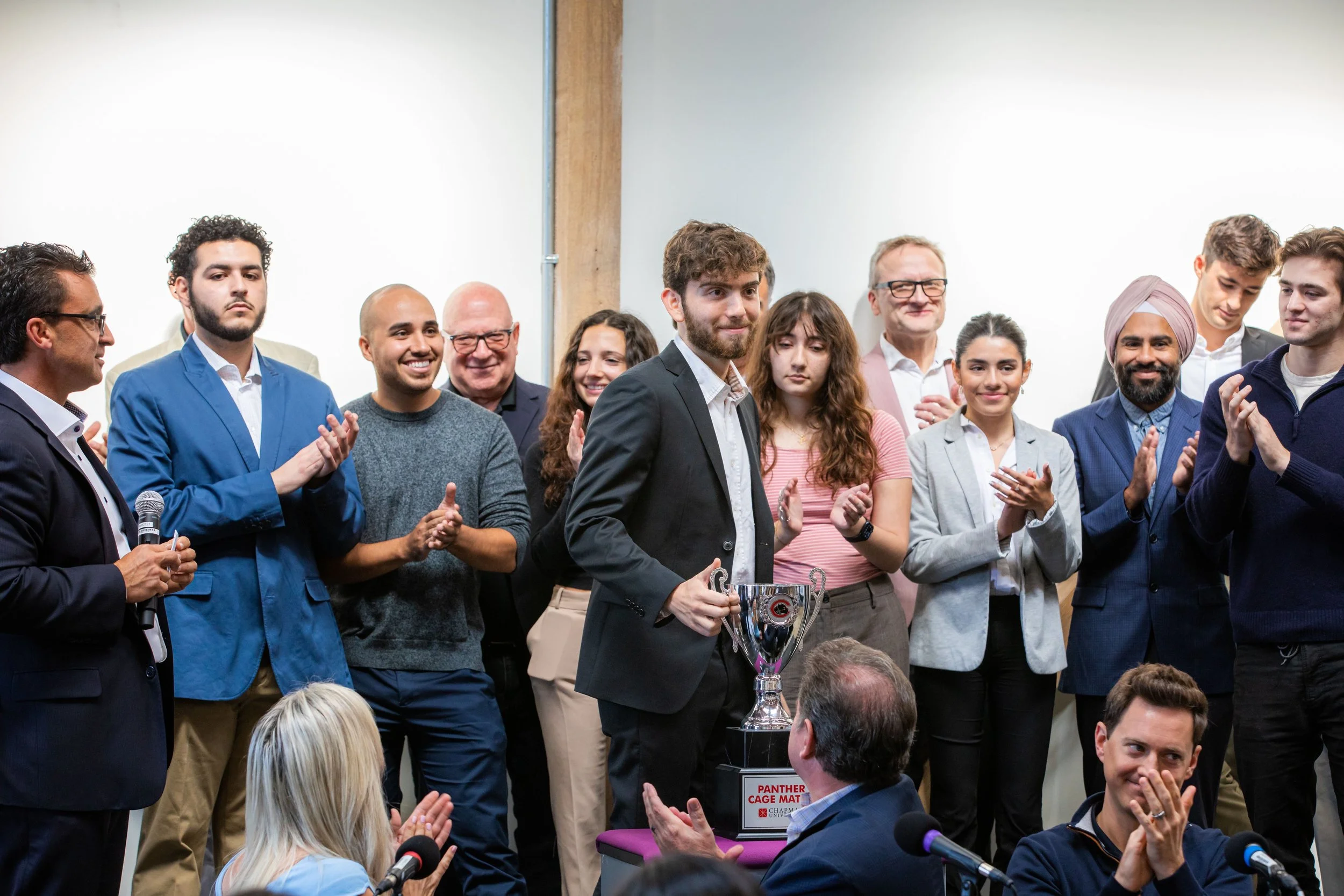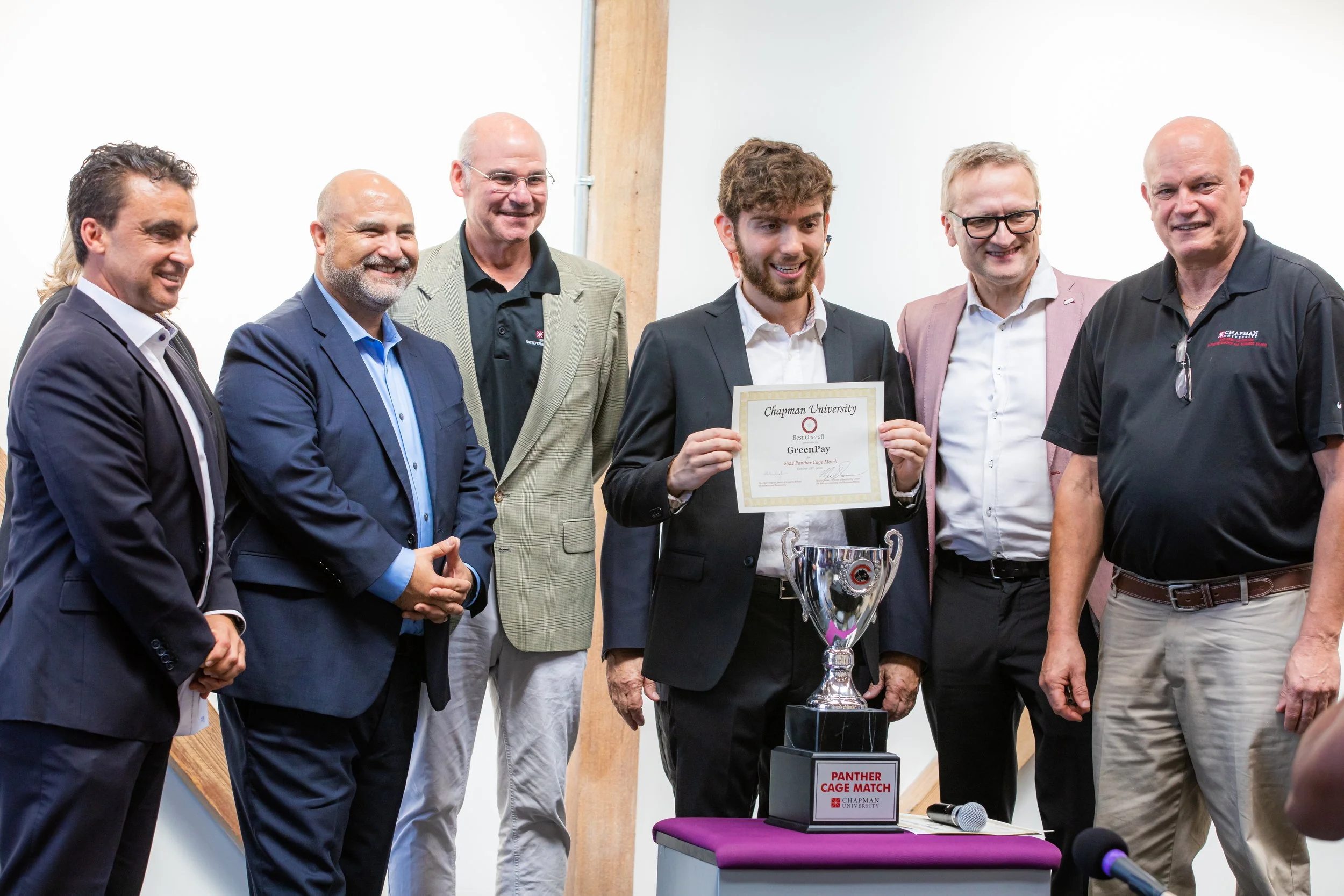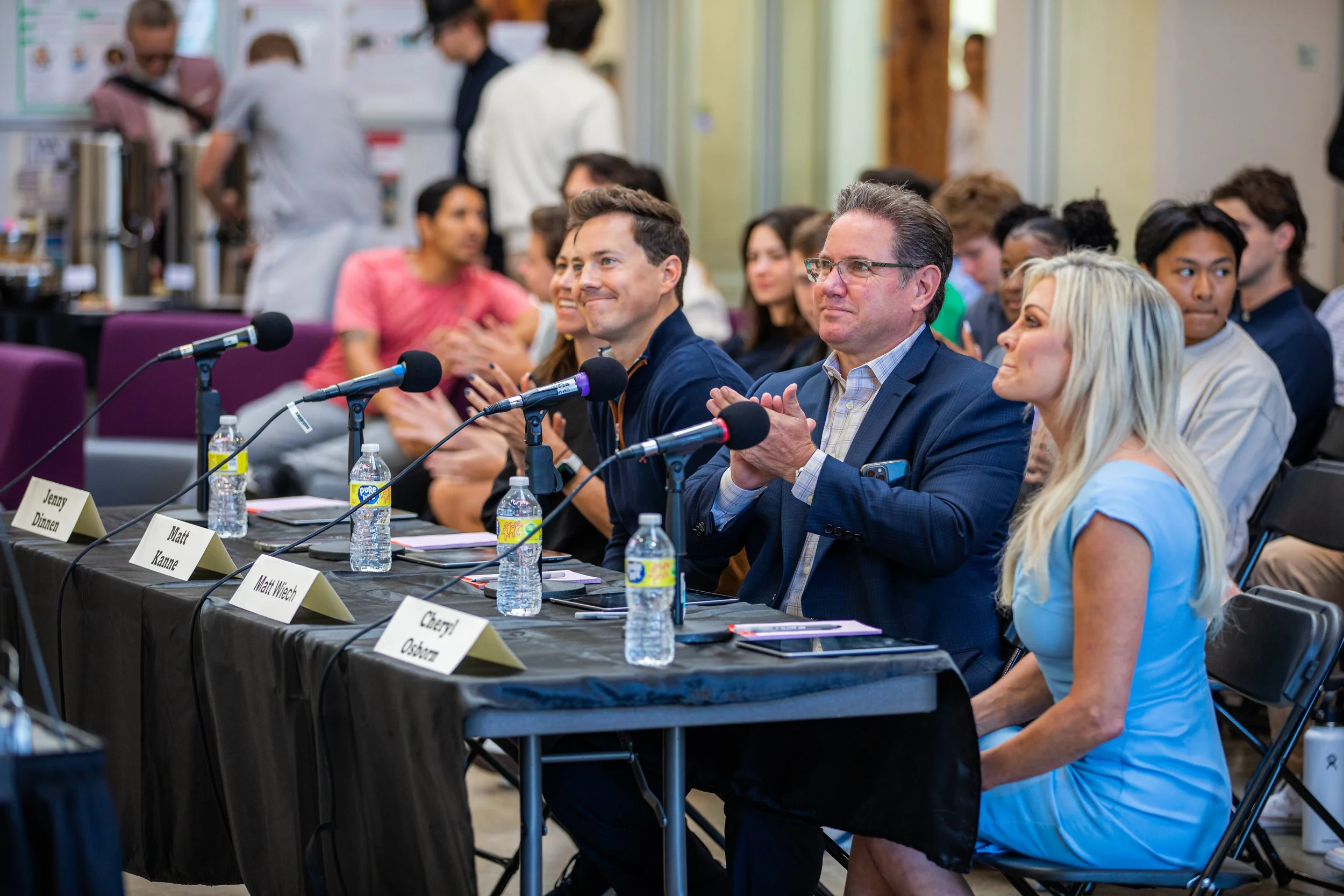Winner declared at Chapman’s first Panther Cage Match since 2019
“Safe Title,” a project heralded by junior Eli Schechter and an acquaintance of his from the Tesla Foundation, won the contest unanimously. Photo courtesy of Eli Schechter
In its first event since its inception in 2019, the Panther Cage Match event held last month declared a unanimous winner in the “Best Overall” category, awarding the win to junior business entrepreneurship major Eli Schechter for his project titled “Safe Title.”
The project seeks to help address fraud in the jewelry industry by securing the transaction of products with blockchain security. At the time of the competition, it was known as “Greenpay.”
As the winner of the “Best Overall” category, Schechter will be awarded $3,000 and have the opportunity to receive pro bono advice from one of the law firms, consulting firms and accounting firms.
According to Schechter, Safe Title has already created a blockchain title of ownership that jewelry retailers can use when selling a $50,000 necklace, $100,000 earrings and other high-end jewelry products.
The blockchain internet is hosted by a decentralized network of millions of computers that independently host the network, making it harder for hackers to hack into the servers and edit or steal other people’s information. In the case of titles of ownership for cars and jewelry, blockchains make hackers and scammers unable to create fake or duplicate versions of these titles of ownership.
“If I own (the title), I will be able to prove I’m the owner, and no one will be able to fake that proof because the blockchain secures it,” Schechter told The Panther. “When you have something like this, that’s going to be perfect proof for insurance reports, police reports and for fighting fraud. Here’s the new technology to solve an old problem.”
As the winner of the “Best Overall” category, Schechter will be awarded $3,000. Photo courtesy of Eli Schechter
Currently, the technology that exists to combat fraud in the jewelry industry is the Jewelers’ Security Alliance, which has a jewelry database that only collects information after jewelry has been stolen.
Safe Title will include Gemology Institute of America (GIA) information/certificates into the Title if the asset has one and Safe Title plans on purchasing carbon credits to make the entire process carbon neutral. Schechter already created a blockchain title of ownership for Gabrielle Jewelry, a jeweler in the heart of Jerusalem.
Additionally, Schechter hopes that eight months from now, the company will be able to raise $5 million.
One issue affecting the retail jewelry industry at the moment is felony fraud. An example of felony fraud is return fraud, which happens when a customer buys a stone or jewelry product from a store, swaps it out with a product that is significantly cheaper and successfully forces the store to accept the return, since the store is unable to provide proof that they didn’t sell that cheap product. This issue tends to result in a multi-billion problem for retailers.
Another issue is friendly fraud, where a customer buys something with their credit card, but then calls the company to say that the item wasn’t what it was described as or that they never bought the item in the first place. This issue tends to result in a multi-billion problem for companies.
Friendly fraud was the case of a second instance between The Pearl Source and the same customer. The customer had tried to return another ring, and while the owner had taken pictures of the ring and its unique blemishes and refused to accept the return, the customer ended up calling their credit card company, which pulled the funds back.
Once created, the details within each title can never be edited, hacked or changed. This is how the Safe Title certificate provides perfect prove for insurance reports, police reports and for fighting fraud. Safe Title seeks to solve more multibillion-dollar problems like creating proof of authenticity, providing blockchain validation of ownership and killing uncertainty around every sale.
The project seeks to help address fraud in the jewelry industry by securing the transaction of products with blockchain security. Photo courtesy of Chapman University
Anthony Lemus, an engineering professor at the Fowler School of Engineering, was part of the first round of judges that went through the 28 pitches and narrowed them down to the six pitches that would be judged for the final round at the event.
“(Safe Title) was really interesting. It’s a really novel idea (and) it’s simple,” Lemus told The Panther. “What they were proposing (for) their presentation was a lot easier to follow, and I think from a business perspective, you could tell they’ve been at it for a while… They did a really nice job, and I think it’s a really novel concept. I think people would clamor to actually buy that product or use it.”
Lemus, who also works as the director of industry relations for Fowler, told The Panther that one of the goals he and the other event creators would like to accomplish with future Panther Cage Match events is being able to have business and engineering majors come together, learn about each other’s worlds and use their combined knowledge to come up with a business plan and product.
“You have to learn how to sell ideas (and) sell projects, and you need to know your market, work with marketing people (and) meet the customer. These are things you don’t learn in the engineering class because you’re taking all the calculations and stuff to design the products,” Lemus said.
“At the business school, on the other side, they meet the customer, look at the financial spreadsheets (and) what the profit is, but they don’t dig deep into technology like an engineer does. Both of these worlds need to be merged together to come up with a robust proposition to be really sellable in the marketplace and competitive in the marketplace when they go compete against other students from other universities competing for the same job.”
Lemus said that Fowler is also working on a future curriculum where engineering students would have to take business classes and business students would have to take engineering classes.
Schechter started working on Safe Title in January this year after an internship with the Tesla Foundation, which helps build startups with businesses that help bring Nikola Tesla’s vision of the future to life. He spoke with Chairman Wilhelm Cashen about running a business together, and the duo decided to pursue Safe Title.
Schechter has a background in digital infrastructure, ranging from websites, and apps to e-commerce stores and cofounded the agency Dream Developers.
Schechter hopes that eight months from now, the company will be able to raise $5 million. Photo courtesy of Chapman University
According to Schechter, one part he found challenging throughout the competition was working on the pitch deck, which had to be around 10 slides and was required as part of the application process.
"I worked really hard to fit the Safe Title idea, business model and investment pitch to their format which had requirements for what each slide conveyed,” Schechter said. “I worked 40 to 50 hours creating and refining my pitch. During that time, I was lucky enough to meet with Chapman professors who I pitched and received feedback on."
According to Mario Leone, the director of the Leatherby Center, the Leatherby Center previously hosted the California Dreamin’ Business Plan Competition, an invite-only two-day event where teams from multiple schools across the nation would come to pitch their business plan or a prototype they developed. At the time, the prizes consisted of a television appearance on a business show and the opportunity to pursue investment opportunities.
The university hosted the Business Plan Competition for a few years up until 2016 when the final competition at Chapman was held, and when Leone was brought on board as the new director. He organized the first-ever Panther Cage Match in 2019.
“The whole premise I had was that (talking) to most entrepreneurs and ones that have started businesses, they don’t come in with a 50-page business plan,” Leone said. “They come in with an idea to take structure in some form; maybe they’ve developed a prototype and pitch their idea to investors or whoever it happens to be.”
That year, they received 38 submissions, and over the course of three rounds, the submissions were narrowed to a smaller amount that the judges in the final round would listen to and vote on which they liked best.
During 2020 and 2021, the competition was not held due to the COVID-19 pandemic. But during this year’s event, the Leatherby Center received around 26 submissions and recruited two rounds of judges. Around 25% of these submissions came from members of the Chapman community not involved with the Argyros School of Business and Economics. For this competition, students were required to submit around 10 slides in a pitch deck.
Judges also awarded Collegial, an app linking college students with the community, and FUN!D, a video game investing platform, the winner for the “Best Emerging” category, while attendees voted to declare Collegial the winner of the “Fan Favorite” categories. These winners will receive $500 and the opportunity to consult one of the Center’s law firm sponsors.
Other projects presented at the event were Shotbot, a drink delivery service created by students in the School of Engineering, Shavy Wavy, a personalized shave ice vendor, and RegentFits, a retail platform intended to offer clothing options for big and tall men.
“If you participated (and) want to continue to develop your idea, we’ve structured this so that we have a partner at a law firm or accounting firms (can) come in and spend two or three hours (at the Leatherby Center)… and essentially give pro bono help and advice,” Leone told The Panther.
Learn more about Safe Title on their newly-watched website.
Editor’s note: A previous version of this story stated that Schechter won $300,000 instead of $3,000. We regret the error. The story has also been updated to more clearly and accurately described Safe Title, blockchain., fraud, the partnership with Gabrielle Jewelry and how exactly Safe Title project works.




